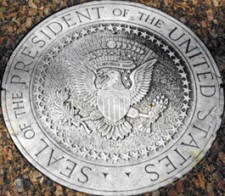By Remi Moncel (Posted: October 18, 2008)
How will the United States’ President-elect run his administration? The answer to this question will have direct impacts on the American people’s health, safety and the quality of their environment.
The 44th President of the United States will enter office faced with an unprecedented set of complex and urgent challenges, including a fragile financial system, spiraling energy and food prices and renewed demands for leadership to combat global warming. The President will need to respond by leading an administration driven by principles of good governance: transparency, inclusiveness and accountability.
In advance of the election, voters should ask where the candidates stand on such issues as checks and balances, signing statements and scientific integrity. After the election, the transition team of the winning party should ensure that these principles of government openness drive the selection of federal agency heads and the new President’s governing style.
A new WRI policy note reveals the link between an unchecked presidency and poor policy. It reviews the practices of previous administrations in the context of relevant constitutional and legislative provisions, and attests to the vulnerability of a system of delicate checks and balances to abuse of power. In addition to the legal abuses they constitute, these cases bring to light significant negative impacts that have resulted from an opaque presidency and make the case for better governance in the next administration.
The cases examined include:
-
Abuse of signing statements. President have issued these pronouncements upon signing bills into a law to brush off important environmental, safety and civil rights provisions mandated by Congress. In 2005 for example, President Bush dismissed important whistleblower protections which Congress had included in the Energy Policy Act. The provisions granted protections to federal employees who would report safety violations in nuclear waste management.
-
National policies designed behind closed doors. Devising the country’s energy policy or health care reform in the open serves several purposes. It enables confrontation of the nation’s top experts and visions with a view to enacting the most effective policies. It guarantees the public’s right to take part in the decision and voice their priorities. Finally, transparent decision-making increases public acceptance of policies and ensures that it meets the interests of the majority over those of an influential, well-connected few. President Clinton’s Task Force on National Health Care Reform, for example, conducted its discussions and activities behind closed doors without releasing the names of the participants. Pharmaceutical companies and justice groups decried the lack of openness surrounding the President’s task force. Ultimately, the lack of political viability and public trust of the initiative caused its demise and the failure the reform the United Sates’ health care system.
-
Distortion of scientific findings. In February 2007 a report by the Union of Concerned Scientists documented “widespread political interference in federal climate science.” Almost half of the 1,600 climate scientists working in government agencies who were surveyed indicated having perceived or personally experienced pressure to eliminate the words “climate change,” “global warming” or other terms from a variety of communications. Effective environmental and health regulations and standards rely on the research and recommendations of scientific experts. Yet, in March 2008, President Bush illegally intervened in the establishment of standards for smog-forming ozone. By law, this decision rested in the hands of the Administrator of the Environmental Protection Agency and its scientists. The President nonetheless overruled their decision and, in doing so, backed more lenient requirements for a gas proven to have negative effects on human health and wildlife.
Our research puts forward a set of practical recommendations for the President-elect:
-
Government-held information should be made available to the public unless limited and clearly articulated exceptions apply. Task forces and ad-hoc committees, not otherwise governed by formal rules, should conduct their work in a transparent and inclusive manner by making publicly available the content of their deliberations as well as the names and affiliations of the participants.
-
The President should not issue signing statements to disregard or decline to enforce a law or to interpret it in a manner inconsistent with the will of Congress. In addition, executive branch officials and agencies should cooperate with Congress in its oversight duties, limit the exercise of discretionary power and abstain from asserting executive privilege to shield the administration from legitimate congressional oversight and requests for disclosure of information. Congress on the other hand should reaffirm its oversight responsibility and take necessary measures to exercise its duty even when faced with a reluctant executive branch.
-
The President should guarantee the non-partisan enforcement of the law and the scientific integrity of federal agencies by appointing administrators that will respect the advice of technical and scientific experts, pursue the non-partisan prosecution of the law and interpret legal provisions in a non-partisan and even-handed manner. The President should protect the right of scientists and researchers to publicly review and comment on documents that use their research or work. Finally, the political review and communication of findings should not undermine the integrity and independence of scientific data and analysis.
Despite the principle of checks and balances enshrined in the U.S. Constitution, Presidents retain a great deal of discretion in the exercise of power. In fact, the executive branch has been reluctant to relinquish the authority and discretion it gradually took over from the other branches of government. Neither major candidate made his views clear on all of these issues in the 2008 presidential election. On Constitution Day, over 35 public interest groups across party lines called upon the candidates to clarify their views on the constitutional issues delineated in this paper.
Voters, supported by the media, may still ask Senators Obama and McCain how they would run their administration as President. After the election, it will be the President-elect’s responsibility to ensure that these principles of good governance are implemented across federal agencies and inform his new leadership.

Comments are closed.